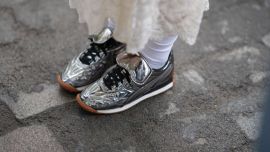Hebe de Bonafini, the iconic and controversial human rights campaigner who led the Madres de Plaza de Mayo association in defying the brutal 1976-1983 military dictatorship and demanding the truth about their missing children, has died at the age of 93.
Almost always seen wearing a white headscarf, the symbol of the Mothers’ struggle, Bonafini was one of the country’s most passionate and controversial human rights campaigners. She was characterised by her often visceral public statements and radical political positions, as well as her support of Kirchnerite leaders.
The death of the Ensenada-born leader, whose group has spent 45 years tirelessly working to uncover the fate of their disappeared children, was confirmed by a post from Vice-President Cristina Fernández de Kirchner, her longtime ally.
"Dearest Hebe, Mother of Plaza de Mayo, world symbol of the struggle for human rights, pride of Argentina. God called you on the Day of National Sovereignty [national holiday]... it must not be by chance. Simply thank you and goodbye," the former president, who had a close relationship with the campaigner, wrote in a tweet.
Reacting to the news, President Alberto Fernández declared three days of national mourning.
The Frente de Todos leader said he was saddened by the loss of the iconic campaigner, declaring his “deep sorrow and respect for Hebe de Bonafini, Mother of Plaza de Mayo and tireless fighter for human rights."
"The government and the Argentine people recognise in her an international symbol of the search for memory, truth and justice for the 30,000 disappeared," wrote the president, adding that the “founder of the Mothers of Plaza de Mayo brought light amidst the dark night of the military dictatorship and paved the way for the recovery of democracy 40 years ago."
The president, like many other politicians, has had an up-and-down relationship with Bonafini. She recently criticised the head of state for “having distanced himself from the course of the people and doing what the corporations ordered him to do," a relatively tame remark by her standards.
Bonafini's relationship with the government and with the Frente de Todos coalition in general was strongly defined by her relationship with Fernández de Kirchner.
Hospitalisation
Bonafini was first admitted to hospital early last month, though she was later discharged on October 13. She eventually passed away at a hospital in La Plata on Sunday morning, where she had been hospitalised for the last few days, her family said in a statement.
“It is with great sorrow that we inform you that today at 9.20am Hebe de Bonafini passed away. We are enormously grateful for the demonstrations of love, support and concern that my mother has received during these days of hospitalisation at Hospital Italiano in the city of La Plata, as throughout her career of activism," read a note from the family signed by her daughter, Alejandra Bonafini.
"These are very difficult moments of deep sadness and we understand the love of the people for Hebe, but at this moment as a family we have the need to mourn the Mother of Plaza de Mayo, Hebe, in private, so we will be informing as of tomorrow which will be the spaces for the tributes and remembrances,” it added.
News of the passing of the human rights activist, whose two sons and daughter-in-law were disappeared by the dictatorship, sparked a mixed reaction among Argentines, underlining the country’s stark political polarisation.
Some 30,000 people were abducted and presumed killed by the regime or right-wing death squads in the 1970s and 1980s for being suspected leftists.
That was compounded by the drama of widespread kidnapping of babies born to suspected dissidents being held during the right-wing dictatorship.
Many babies – the offspring of now-dead dissidents – were born in captivity without the knowledge of their blood relatives and were given to military families to adopt.
Initially thought of as a pure human rights campaigner, Bonafini’s figure became increasingly more political in the late 1980s, especially after the Madres split into two separate organisations: the Madres de Plaza de Mayo and the Madres de Plaza de Mayo-Línea Fundadora (“Founding line”).
Seen as the leading the more political of the factions, Bonafini was a fierce defender of former president Néstor Kirchner’s time in office and of the achievements of the Kirchnerite governments overall.
Her organisation mixed increasingly with the political class and, during Fernández de Kirchner’s two terms in office,was a recipient of public funds, expanding into the education and construction sectors.
In 2017, she was prosecuted for the alleged misappropriation of public funds for housing projects undertaken by Sueños Compartidos foundation, which was organised by the Madres de Plaza de Mayo Foundation and created by businessman Sergio Schoklender.
After initial controversy, she later agreed to testify in the case and was prosecuted as a participant in the alleged fraud that took place.
Bonafini claims the charge was part of a “political act” by then-president Mauricio Macri, who she considered an "enemy." In May 2019, the case was brought to trial by a judge, but proceedings have remained paralysed ever since. The case had not been resolved at the time of her death.
Obituary
Hebe María Pastor, better known as Hebe de Bonafini, was born on December 4, 1928, to a simple family in Ensenada, Buenos Aires Province.
The daughter of Francisco Pastor and Josefa Bogetti, she was raised in the El Dique neighbourhood on the outskirts of La Plata.
Hebe's childhood was marked by humility and simplicity. She famously said she was unable to finish her primary school education because her family did not have enough money to pay for her bus tickets.
"I had a happy childhood where one learned to enjoy the little things," she recalled in one of the many interviews she granted throughout her life.
Later, at the age of 14, she married Humberto Alfredo Bonafini, with whom she had three children: Jorge Omar, Raúl Alfredo and María Alejandra. The eldest two were both victims of the dictatorship.
When the military seized power in 1976, ousting Isabel Perón, the wife of late president Juan Domingo Perón. Bonafini was a housewife.
Her son Jorge was the first to suffer at the hands of the military junta. He was beaten and tortured in his home as part of an illegal operation which led to his forced disappearance. Jorge was hooded and put in a car and taken away. His family would never see him again.
"You never think that these things are going to happen to you, until it happened to us," lamented Bonafini in a statement.
In the search for her son, Hebe met another woman in a courtroom in a similar situation, Azucena Villaflor. The two quickly connected. Their meeting was a foundational moment for the later marches in Plaza de Mayo, which began on Saturday April 30, 1977, and were soon attended by hundreds wearing the characteristic white headscarves persisting to this day.
"We began to gather more and more at the square. At first we didn't walk, we were gathered together, until one day the police came, hit us, told us to 'walk', we grabbed each other's arms and started to walk in pairs," Bonafini said. They called us "the madwomen of the square.’”
Bonafini was one of the founders of the Madres de Plaza de Mayo, uniting a group of mothers who protested in front of the Casa Rosada, desperate to know the whereabouts of tens of thousands who were abducted during the brutal 1976-1983 military regime.
Raúl, Bonafini’s second son, was later abducted on December 6 of the same year in Berazategui while attending a trade union meeting. He disappeared in an illegal raid on the location.
Her daughter-in-law, María Elena Bugnone Cepeda, Jorge Omar's wife, also went missing, on May 25, 1978.
Both the disappearances of Jorge and Raúl were included in trials investigating crimes against humanity and the perpetrators were condemned and given jail terms.
Driven, tireless campaigner
At the age of 49, Hebe had lost two of her children and, in 1983, her husband Humberto Alfredo Bonafini also passed away. It has long been thought that the pain she suffered was in fact what fuelled her, turning her into a tireless campaigner and figure of struggle, one driven by the need for answers and justice.
"I forgot who I was the day they disappeared, I never thought about myself again," Bonafini said recently at the opening of a photographic exhibition at the Kirchner Cultural Centre in Buenos Aires.
Her struggle with the Madres prompted international support. Bonafini was taken on stage by Britain's Sting and Ireland's U2; in Paris, by Yves Montand, Simone Signoret, Catherine Deneuve and also François Mitterrand, who also demonstrated in front of the Argentine Embassy in the French capital.
While Bonafini will be remembered in the main for co-founding the Madres de Plaza de Mayo, her controversial remarks are likely to define much of her legacy.
For example, she also sparked controversy with remarks delivered on September 11, 2002, when she celebrated the attacks on the World Trade Center towers in the United States.
“I am not going to be hypocritical on this issue,” she said in an interview. “It didn’t hurt me at all.”
In 2005, she said that Pope John Paul II "had committed many sins" and would "go to hell." Addressing the state of Argentina’s politics in 2011, she said that Congress was “nothing but a nest of rats and vipers.”
In 2015, while apparently condemning the attack on the offices of the French satirical magazine Charlie Hebdo, she declared that “colonialist France left thousands of small countries in ruins and so has no moral authority to talk about criminal terrorism.”
– TIMES/NA/PERFIL/AFP




















Comments